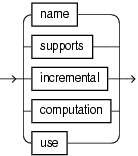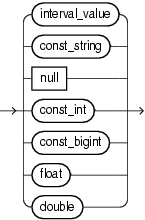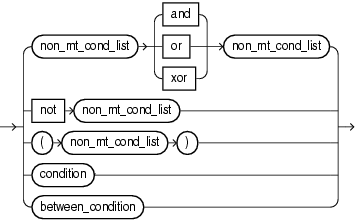7 Common Oracle CQL DDL Clauses
A reference to clauses in the data definition language (DDL) in Oracle Continuous Query Language (Oracle CQL) is provided.
7.1 Introduction to Common Oracle CQL DDL Clauses
Oracle CQL supports the following common DDL clauses:
For more information on Oracle CQL statements, see Oracle CQL Statements.
7.2 array_type
Purpose
Use the array_type clause to specify an Oracle CQL data cartridge type composed of a sequence of complex_type components, all of the same type.
Note:
Oracle CQL supports single-dimension arrays only. That is, you can use java.lang.String[] but not java.lang.String[][].
Prerequisites
None.
Syntax
array_type::=

Semantics
Array Declaration
You declare an array type using the qualified_type_name of the Oracle CQL data cartridge complex_type. Only arrays of complextype are supported: you cannot declare an array of Oracle CQL simple types unless there is an equivalent type defined in the Oracle CQL Java data cartridge.
Array Access
You access a complex_type array element by integer index. The index begins at 0 or 1 depending on the data cartridge implementation.
There is no support for the instantiation of new array type instances directly in Oracle CQL at the time you access an array. For example, the following is not allowed:
SELECT java.lang.String[10] ...
Examples
The following example shows how to create an event type as a Java class that specifies an event property as an array of Oracle CQL data cartridge complex type MyClass defined in package com.mypackage.
package com.myapplication.event;
import java.util.Date;
public final class MarketEvent {
private final String symbol;
private final Double price;
private final com.mypackage.MyClass[] a1;
public MarketEvent(...) {
...
}
...
}Array Declaration Example: Oracle CQL Simple Type
Only arrays of Oracle CQL data cartridge types are supported: you cannot declare an array of Oracle CQL simple types.
int[] a1
However, you can work around this by using the Oracle CQL Java data cartridge and referencing the Java equivalent of the simple type, if one exists:
int@java[] a1
For more information on the @ syntax, see link::=.
Array Access Examples
The following example shows how to register the following queries that use Oracle CQL data cartridge complex type array access:
-
View
v1accesses the third element of the arraya1. This array contains instances of Oracle CQL data cartridge complex typecom.mypackage.MyClass. -
Query
q1accesses the first element of the arrayfield1. This array is defined on Oracle CQL data cartridge complex typea1.
<view id="v1" schema="symbol price a1"><![CDATA[ IStream(select symbol, price, a1[3] from S1[range 10 slide 10]) ]]></view> <query id="q1"><![CDATA[ SELECT a1.field1[1] … ]]></query>
7.3 attr
Purpose
Use the attr clause to specify a stream element or pseudocolumn.
You can use the attr clause in the following Oracle CQL statements:
Prerequisites
None.
Semantics
identifier
Specify the identifier of the stream element.
You can specify
-
StreamOrViewName.ElementName -
ElementName -
CorrelationName.PseudoColumn -
PseudoColumn.
For examples, see Examples.
Example 7-1 pseudo_column
Specify the timestamp associated with a specific stream element, all stream elements, or the stream element associated with a correlation name in a MATCH_RECOGNIZE clause.
For examples, see:
For more information, see Pseudocolumns.
Examples
Given the stream, valid attribute clauses are:
-
ItemTempStream.temp -
temp -
B.element_time -
element_time
<view id="ItemTempStream" schema="itemId temp"><![CDATA[ IStream(select * from ItemTemp) ]]></view> <query id="detectPerish"><![CDATA[ select its.itemId from ItemTempStream MATCH_RECOGNIZE ( PARTITION BY itemId MEASURES A.itemId as itemId PATTERN (A B* C) DEFINE A AS (A.temp >= 25), B AS ((B.temp >= 25) and (to_timestamp(B.element_time) - to_timestamp(A.element_time) < INTERVAL "0 00:00:05.00" DAY TO SECOND)), C AS (to_timestamp(C.element_time) - to_timestamp(A.element_time) >= INTERVAL "0 00:00:05.00" DAY TO SECOND) ) as its ]]></query>
7.4 attrspec
Purpose
Use the attrspec clause to define the identifier and data type of a stream element.
Prerequisites
None.
Semantics
identifier
Specify the identifier of the stream element.
fixed_length_datatype
Specify the stream element data type as a fixed-length data type.
For syntax, see fixed_length_datatype::= .
variable_length_datatype
Specify the stream element data type as a variable-length data type.
For syntax, see variable_length_datatype::=.
integer
Specify the length of the variable-length data type.
7.5 complex_type
Purpose
Use the complex_type clause to specify an Oracle CQL data cartridge type that defines:
-
member fields (static or instance)
-
member methods (static or instance)
-
constructors.
The type of a field, and the return type and parameter list of a method may be complex types or simple types.
A complex type is identified by its qualified type name (set of identifiers separated by a period ".") and the optional name of the data cartridge to which it belongs (see link::=). If you do not specify a link name, then Oracle Event Processing assumes that the complex type is a Java class (that is, Oracle Event Processing assumes that the complex type belongs to the Java data cartridge).
Prerequisites
The Oracle CQL data cartridge that provides the complextype must be loaded by Oracle Event Processing server at runtime.
Semantics
fieldname
Use the fieldname clause to specify a static field of an Oracle CQL data cartridge complex type.
Field Access
You cannot use a complex type l-value generated in expressions within an ORDER BY clause. Currently, only expressions within a SELECT clause and a WHERE clause may generate a complex type l-value.
You may access only a static field using qualified_type_name. To access a non-static field, you must first instantiate the complex type.
Method Access
Accessing complex type setter methods may cause side effects. Side effects decrease the opportunities for concurrency and sharing. For example, if you invoke a setter method and change the value of a view attribute (such as an event property) shared by different queries that depend on the view, then the query results may change as a side effect of your method invocation.
You may access only a static method using qualified_type_name. To access a non-static field, you must first instantiate the complex type.
Constructor Invocation
You may access only a static fields and static methods using qualified_type_name. To access a non-static field or non-static method, you must first instantiate the complex type by invoking one of its constructors.
Examples
Field Access Examples: complex_type
The following example shows how to register the following queries that use Oracle CQL data cartridge complex type field access:
-
Query
q1accesses fieldmyFieldfrom Oracle CQL data cartridge complex typea1. -
Query
q2accesses fieldmyFielddefined on the Oracle CQL data cartridge complex type returned by the methodfunction-returning-object.Query
q3accesses fieldmyNestedFielddefined on the Oracle CQL data cartridge complex typemyFieldwhich is defined on Oracle CQL data cartridge complex typea1. -
Query
q4accesses the static fieldmyStaticFielddefined in the classMyTypein packagecom.myPackage. Note that a link (@myCartridge) is necessary in the case of a static field.
<query id="q1"><![CDATA[ SELECT a1.myField … ]]></query> <query id="q2"><![CDATA[ SELECT function-returning-object().myField … ]]></query> <query id="q3"><![CDATA[ SELECT a1.myField.myNestedField … ]]></query> <query id="q4"><![CDATA[ SELECT com.myPackage.MyType.myStaticField@myCartridge … ]]></query>
Method Access Examples: complex_type
The following example shows how to register the following queries that use Oracle CQL data cartridge complex type method access:
-
Query
q1accesses methodmyMethoddefined on Oracle CQL data cartridge complex typea1. This query accesses the method with an empty parameter list. -
Query
q2accesses methodmyMethoddefined on Oracle CQL data cartridge complex typea1with a different signature than in queryq1. In this case, the query accesses the method with a three-argument parameter list. -
Query
q3accesses static methodmyStaticMethoddefined on Oracle CQL data cartridge complex typeMyType. This query accesses the method with a single parameter. Note that a link (@myCartridge) is necessary in the case of a static method.
<query id="q1"><![CDATA[
SELECT a1.myMethod() …
]]></query>
<query id="q2"><![CDATA[
SELECT a1.myMethod(a2, “foo", 10) …
]]></query>
<query id="q3"><![CDATA[
SELECT myPackage.MyType.myStaticMethod@myCartridge("foo") …
]]></query>Constructor Invocation Examples: complex_type
The following example shows how to register the following queries that use Oracle CQL data cartridge complex type constructor invocation:
-
Query
q1invokes the constructorStringdefined in packagejava.lang. In this case, the query invokes the constructor with an empty argument list. -
Query
q2invokes the constructorStringdefined in packagejava.lang. In this case, the query invokes the constructor with a single argument parameter list and invokes the non-static methodsubstringdefined on the returnedStringinstance.
<query id="q1"><![CDATA[ SELECT java.lang.String() … ]]></query> <query id="q2"><![CDATA[ SELECT java.lang.String(“food").substring(0,1) … ]]></query>
7.6 const_bigint
Purpose
Use the const_bigint clause to specify a big integer numeric literal.
You can use the const_bigint clause in the following Oracle CQL statements:
For more information, see Numeric Literals.
Prerequisites
None.
Syntax
const_bigint::=

7.7 const_int
Purpose
Use the const_int clause to specify an integer numeric literal.
You can use the const_int clause in the following Oracle CQL statements:
For more information, see Numeric Literals.
Prerequisites
None.
Syntax
const_int::=

7.8 const_string
Purpose
Use the const_string clause to specify a constant String text literal.
You can use the const_string clause in the following Oracle CQL statements:
For more information, see Text Literals.
Prerequisites
None.
Syntax
Figure 7-3 const_string::=

7.9 const_value
Purpose
Use the const_value clause to specify a literal value.
You can use the const_value clause in the following Oracle CQL statements:
For more information, see Literals.
Prerequisites
None.
Example 7-2 interval_value
Specify an interval constant value as a quoted string. For example:
INTERVAL '4 5:12:10.222' DAY TO SECOND(3)
For more information, see Interval Literals.
const_string
Specify a quoted String constant value.
For more information, see Text Literals.
null
Specify a null constant value.
For more information, see Nulls.
const_int
Specify an int constant value.
For more information, see Numeric Literals.
bigint
Specify a bigint constant value.
For more information, see Numeric Literals.
float
Specify a float constant value.
For more information, see Numeric Literals.
7.10 identifier
Purpose
Use the identifier clause to reference an existing Oracle CQL schema object.
You can use the identifier clause in the following Oracle CQL statements:
Prerequisites
The schema object must already exist.
Example 7-3 unreserved_keyword::=

Semantics
const_string
Specify the identifier as a String.
For more information, see Schema Object Naming Rules.
[A-Z]
Specify the identifier as a single uppercase letter.
unreserved_keyword
These are names that you may use as identifiers.
For more information, see:
reserved_keyword
These are names that you may not use as identifiers, because they are reserved keywords: add, aggregate, all, alter, and, application, as, asc, avg, between, bigint, binding, binjoin, binstreamjoin, boolean, by, byte, callout, case, char, clear, columns, constraint, content, count, create, day, days, decode, define, derived, desc, destination, disable, distinct, document, double, drop, dstream, dump, duration, duration, element_time, else, enable, end, evalname, event, events, except, external, false, first, float, from, function, group, groupaggr, having, heartbeat, hour, hours, identified, implement, in, include, index, instance, int, integer, intersect, interval, is, istream, java, key, language, last, level, like, lineage, logging, match_recognize, matches, max, measures, metadata_query, metadata_system, metadata_table, metadata_userfunc, metadata_view, metadata_window, microsecond, microseconds, millisecond, milliseconds, min, minus, minute, minutes, monitoring, multiples, nanosecond, nanoseconds, not, now, null, nulls, object, of, on, operator, or, order, orderbytop, output, partition, partitionwin, partnwin, passing, path, pattern, patternstrm, patternstrmb, prev, primary, project, push, query, queue, range, rangewin, real, register, relation, relsrc, remove, return, returning, rows, rowwin, rstream, run, run_time, sched_name, sched_threaded, schema, second, seconds, select, semantics, set, silent, sink, slide, source, spill, start, stop, storage, store, stream, strmsrc, subset, sum, synopsis, system, systemstate, then, time, time_slice, timeout, timer, timestamp, timestamped, to, true, trusted, type, unbounded, union, update, using, value, view, viewrelnsrc, viewstrmsrc, wellformed, when, where, window, xmlagg, xmlattributes, xmlcolattval, xmlconcat, xmldata, xmlelement, xmlexists, xmlforest, xmlparse, xmlquery, xmltable, xmltype, or xor.
7.11 l-value
Purpose
Use the l-value clause to specify an integer literal.
Prerequisites
None.
Syntax
l-value::=

7.12 methodname
Purpose
Use the methodname clause to specify a method of an Oracle CQL data cartridge complex type.
Prerequisites
None.
7.13 non_mt_arg_list
Purpose
Use the non_mt_arg_list clause to specify one or more arguments as arithmetic expressions involving stream elements.
You can use the non_mt_arg_list clause in the following Oracle CQL statements:
Prerequisites
If any stream elements are referenced, the stream must already exist.
Semantics
arith_expr
Specify the arithmetic expression that resolves to the argument value.
7.14 non_mt_attr_list
Purpose
Use the non_mt_attr_list clause to specify one or more arguments as stream elements directly.
You can use the non_mt_attr_list clause in the following Oracle CQL statements:
Prerequisites
If any stream elements are referenced, the stream must already exist.
Syntax
Figure 7-7 non_mt_attr_list::=

Semantics
attr
Specify the argument as a stream element directly.
7.15 non_mt_attrname_list
Purpose
Use the non_mt_attrname_list clause to one or more stream elements by name.
You can use the non_mt_attrname_list clause in the following Oracle CQL statements:
Prerequisites
If any stream elements are referenced, the stream must already exist.
Syntax
Figure 7-8 non_mt_attrname_list::=

Semantics
identifier
Specify the stream element by name.
7.16 non_mt_attrspec_list
Purpose
Use the non_mt_attrspec_list clause to specify one or more attribute specifications that define the identifier and data type of stream elements.
You can use the non_mt_attrspec_list clause in the following Oracle CQL statements:
-
View.
Prerequisites
If any stream elements are referenced, the stream must already exist.
Syntax
non_mt_attrspec_list::=

Semantics
attrspec
Specify the attribute identifier and data type.
7.17 non_mt_cond_list
Purpose
Use the non_mt_cond_list clause to specify one or more conditions using any combination of logical operators AND, OR, XOR and NOT.
You can use the non_mt_cond_list clause in the following Oracle CQL statements:
For more information, see Conditions.
Prerequisites
None.
Semantics
condition
Specify a comparison condition.
For more information, see Comparison Conditions.
For syntax, see condition::=.
between_condition
Specify a condition that tests for inclusion in a range.
For more information, see Range Conditions.
For syntax, see between_condition::=.
7.18 out_of_line_constraint
Purpose
Use this out_of_line_constraint clause to restrict a tuple of any data type by a primary key integrity constraint.
If you plan to configure a query on a relation with USE UPDATE SEMANTICS, you must declare one or more stream elements as a primary key. Use this constraint to specify a compound primary key made up of one or more stream element values.
You can use the out_of_line_constraint clause in the following Oracle CQL statements:
For more information, see:
Prerequisites
A tuple that you specify with an out_of_line_constraint may not contain a null value.
Syntax
out_of_line_constraint::=

Semantics
non_mt_attrname_list
Specify one or more tuples to restrict by a primary key integrity constraint.
7.19 param_list
Purpose
Use the param_list clause to specify a comma-separated list of zero or more parameters, similar to a function parameter list, for an Oracle CQL data cartridge complex type method or constructor.
You can use the param_list clause in the following Oracle CQL data cartridge statements:
Prerequisites
None.
7.20 qualified_type_name
Purpose
Use the qualified_type_name clause to specify a fully specified type name of an Oracle CQL data cartridge complex type, for example java.lang.String. Use the qualified_type_name when invoking Oracle CQL data cartridge static fields, static methods, or constructors.
There is no default package. For example, using the Java data cartridge, you must specify java.lang when referencing the class String. To be able to distinguish a reserved word from a qualified type, all qualified types must have at least two identifiers, that is, there must be at least one period (.) in a qualified name.
Prerequisites
None.
Semantics
package_name
Use the package_name clause to specify the name of an Oracle CQL data cartridge package.
class_name
Use the class_name clause to specify the name of an Oracle CQL data cartridge Class.
7.21 query_ref
Purpose
Use the query_ref clause to reference an existing Oracle CQL query by name.
You can reference a Oracle CQL query in the following Oracle CQL statements:
Prerequisites
The query must already exist (see Query).
Syntax
Figure 7-9 query_ref::=

Semantics
identifier
Specify the name of the query. This is the name you use to reference the query in subsequent Oracle CQL statements.
7.22 time_spec
Purpose
Use the time_spec clause to define a time duration in days, hours, minutes, seconds, milliseconds, or nanoseconds.
Default: if units are not specified, Oracle Event Processing assumes [second|seconds].
You can use the time_spec clause in the following Oracle CQL statements:
-
windows_type in Query Semantics
Prerequisites
None.
Syntax
Figure 7-10 time_spec::=

Figure 7-11 time_unit::=

Semantics
integer
Specify the number of time units.
time_unit
Specify the unit of time.
7.23 xml_attribute_list
Purpose
Use the xml_attribute_list clause to specify one or more XML attributes.
You can use the xml_attribute_list clause in the following Oracle CQL statements:
Prerequisites
If any stream elements are referenced, the stream must already exist.
Syntax
xml_attribute_list::=

Semantics
xml_attr_list
Specify one or more XML attributes.
<query id="tkdata51_q1"><![CDATA[ select XMLELEMENT(NAME "S0", XMLATTRIBUTES(tkdata51_S0.c1 as "C1", tkdata51_S0.c2 as "C2"), XMLELEMENT(NAME "c1_plus_c2", c1+c2), XMLELEMENT(NAME "c2_plus_10", c2+10.0)) from tkdata51_S0 [range 1] ]]> </query>
7.24 xml_attr_list
Purpose
Use the xml_attr_list clause to specify one or more XML attributes..
You can use the xml_attr_list clause in the following Oracle CQL statements:
Prerequisites
If any stream elements are referenced, the stream must already exist.
Semantics
xml_attr
Specify an XML attribute.
7.25 xqryargs_list
Purpose
Use the xqryargs_list clause to specify one or more arguments to an XML query.
You can use the non_mt_arg_list clause in the following Oracle CQL statements:
Prerequisites
If any stream elements are referenced, the stream must already exist.
Semantics
xqryarg
A clause that binds a stream element value to an XQuery variable or XPath operator.
You can bind any arithmetic expression that involves one or more stream elements (see arith_expr::=) to either a variable in a given XQuery or an XPath operator such as "." as a quoted string.

















